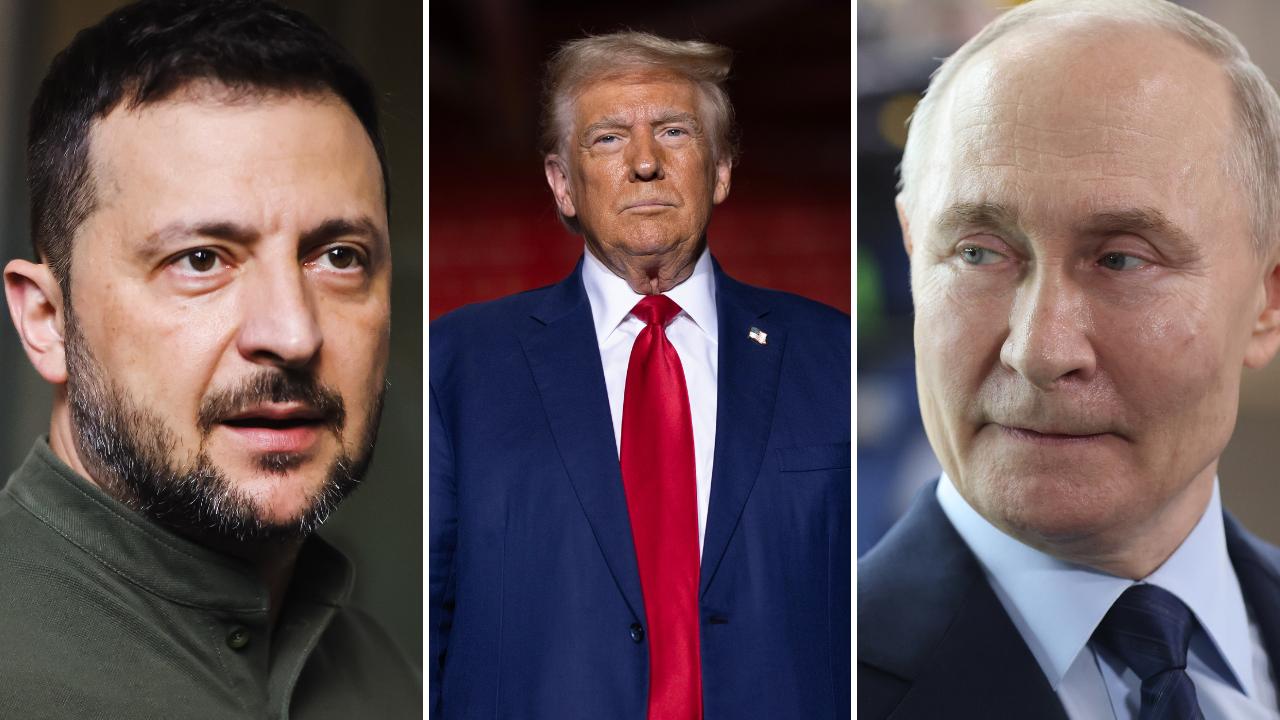World
Russia claims Trump, Putin talk brought world from ‘brink of Apocalypse,’ EU warns of ‘dirty tricks’

Russia’s Deputy Chairman of the Security Council Warns of Nuclear Escalation Amid Heightened Tensions
On Thursday, Dmitry Medvedev, Russia’s deputy chairman of the Security Council, made alarming remarks about the state of global affairs, claiming that a recent discussion between former U.S. President Donald Trump and Russian President Vladimir Putin had brought the world back from the "brink of the Apocalypse." Medvedev’s statements were laced with criticism directed at the United States, accusing it of acting as the self-proclaimed leader of the world with the exclusive right to impose its will, wage hybrid wars, and mete out justice and pardons. He asserted that this perceived arrogance on the part of the U.S. had nearly led to the destruction of humanity. While Medvedev refrained from acknowledging the West’s collective support for Ukraine following Russia’s invasion, he ominously warned that failure to recognize the gravity of the situation could result in the "Doomsday Clock" inching closer to midnight, a clear threat of nuclear escalation. His remarks underscored the heightened tensions between Russia and the West, as well as the growing concerns about the consequences of unchecked geopolitical rivalry.
Trump’s Call with Putin Sparks Geopolitical Controversy and Concern
Medvedev’s comments came on the heels of a contentious telephone call between Trump and Putin, which sparked widespread geopolitical shockwaves. In a post on his Truth Social platform, Trump declared that peace talks would commence "immediately," a statement that was met with skepticism and concern from European leaders. Just hours prior to Trump’s announcement, U.S. Defense Secretary Pete Hegseth had downplayed the likelihood of Ukraine joining the NATO alliance, a stance that was interpreted by some as offering a concession to Russia. The confluence of these events—Trump’s abrupt call for peace talks and Hegseth’s remarks on NATO—has raised questions about the United States’ approach to the conflict and its implications for Ukraine’s sovereignty.
European Leaders Express Alarm Over Potential Concessions to Russia
European leaders were quick to respond to Trump’s and Putin’s overtures, expressing widespread concern about the potential for concessions to Russia before peace talks had even begun. Kaja Kallas, the EU’s foreign policy chief, warned against surrendering to Russia’s demands prematurely, calling such an approach "not wise." She emphasized that any peace agreement must involve the full participation of both Europeans and Ukrainians to ensure its success and legitimacy. "Quick fixes are just dirty deals," Kallas remarked, highlighting the risks of rushing into an agreement that could undermine Ukraine’s interests and embolden other adversarial powers, such as China. Her comments reflected a broader sentiment among European leaders, who are wary of any deal that might compromise Ukraine’s sovereignty or weaken the resolve of the transatlantic alliance.
NATO Leaders Urge Strength and Unity in the Face of Russian Aggression
NATO defense ministers, who had recently convened for discussions, also voiced their concerns about the unfolding developments. Lithuania’s Defense Minister, Dovile Sakaliene, presented European leaders with a stark choice: either fall into the "illusion" that Trump and Putin could forge a solution beneficial to all, or assert Europe’s economic, financial, and military capabilities to determine the course of events in Ukraine. Sakaliene’s remarks underscored the tension between relying on U.S. leadership and charting an independent course for Europe. Meanwhile, Estonia’s Defense Minister, Hanno Pevkur, reiterated the necessity of Ukraine’s involvement in any peace negotiations, stating unequivocally, "It cannot be so that someone will come and say when to talk. It has to be Ukraine." These statements highlight the growing resolve among European leaders to ensure that Ukraine’s voice is not marginalized in any future talks.
Critics Fear Trump’s Negotiation Tactics Could Harm Ukraine’s Interests
Amid the flurry of diplomatic activity, critics have expressed growing concerns that Trump’s approach to negotiations could result in Ukraine being pressured to concede too much in exchange for a rapid peace agreement. These fears were echoed by U.K. Prime Minister Keir Starmer, who asserted that any negotiations about Ukraine’s future must place the country at their core. Starmer’s stance was supported by a joint statement issued by seven European leaders, including those from the U.K., France, Germany, Poland, Italy, Spain, and the EU, who collectively emphasized the importance of ensuring Ukraine’s strength and agency in any peace process. Their shared objective, as outlined in the statement, is to empower Ukraine to negotiate from a position of strength, rather than being forced into a disadvantageous agreement.
Zelenskyy Signals Willingness to Compromise While European Leaders Insist on Ukraine’s Central Role
Despite the concerns about potential concessions, Ukrainian President Volodymyr Zelenskyy has signaled his openness to territorial compromises in pursuit of a "lasting, reliable peace." Specifically, he has proposed swapping Ukrainian-controlled land in Russia for territory currently occupied by Russian forces in eastern Ukraine. Zelenskyy’s willingness to negotiate, however, is tempered by his insistence on maintaining Ukraine’s sovereignty and territorial integrity. His remarks followed a conversation with Trump, during which the former U.S. president reportedly discussed the prospects of peace with Putin. As diplomatic efforts continue to unfold, European leaders remain resolute in their commitment to Ukraine’s sovereignty, rejecting any notion of a peace agreement that excludes Kyiv or undermines its interests. The conflicting signals from Washington and Moscow have only deepened the uncertainty surrounding the conflict, leaving many to wonder whether the world is inching closer to a resolution—or further into the abyss of instability.
In summary, the recent exchanges between Trump, Putin, and European leaders have highlighted the precarious state of international relations, with tensions running high over issues of territorial sovereignty, nuclear deterrence, and the role of global powers in shaping the future of Ukraine. As diplomatic efforts intensify, the world waits with bated breath to see whether the path forward will lead to peace and stability—or continued conflict and escalation.











